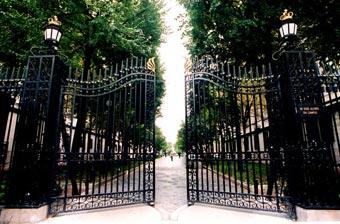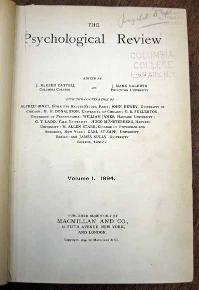A Brief History

The history of the psychology department at Columbia is one of vacillation between a broad and a narrow vision of what psychology encompasses. Its inception was in a course first offered in 1867 under the auspices of the Department of Moral and Intellectual Philosophy and English Literature. It was a course, open only to seniors, in which the philosophy of intellect, feelings, and will were discussed. As the field gained momentum and academic stature, the Department of Moral and Intellectual Philosophy and English Literature offered "The Principles of Philosophy and Psychology" in 1877. This new course was offered, according to the contemporaneous course catalog, with special reference to the results of modern biological research as affecting these sciences. With the separation of the English department from the Department of Philosophy, Ethics, and Psychology in 1881, psychology was en route to independent status.
Advancement of Experimental Psychology
By 1891, a number of experimental psychology courses was offered and, in 1892, a professorship in psychology was created for James Catell, who founded one of America’s earliest experimental laboratories at Columbia. At that time, University administrators were reluctant to provide the financial resources necessary to establish, equip, and maintain these laboratories. For psychologists, marketing of the laboratory was important for student recruitment and, moreover, it was also a public statement of the scientific legitimacy of the discipline.
In 1898, Cattell was appointed to head the Department of Psychology, Philosophy, and Anthropology. Under Cattell’s supervision, Columbia awarded more doctorates in psychology than any other U.S. graduate school. During his tenure, psychology became a required course in the undergraduate curriculum and rivaled the other leading sciences in the number of students attracted. Though controversial at the time, Cattell felt that experimental approaches to psychology, especially those involving "psycho-physical" measurement, were critical to the rise and continued success of academic psychology. He also helped shape the field by taking a leading role in the founding of the American Psychological Association in 1892 and of Psychological Review in 1894, which he edited for many years afterward.

Reshaping Psychology
Two of Catell’s students, Edward Thorndike and Robert S. Woodworth, went on to further shape the field of learning. From the 1920s through the 1940s, Woodworth, the acknowledged dean of American experimental psychology, set up the eclectic orientation of the department and recruited a remarkable group of faculty, including Gardner Murphy, Otto Klineberg, Fred Keller, William Schoenfeld, and Clancy Graham.
By the early 1930s, the psychology department at Columbia had become sufficiently influential that the "Columbia School of Psychology" was considered one of the seven major psychologies, along with gestalt, behaviorist and psychoanalytic. Woodworth's scholarly approach pervaded the department so that many of his colleagues also wrote pioneering encyclopedic works in their particular fields of specialization. The writings of Columbia psychologists truly shaped the field. Amongst them was Gardner Murphy whose 1931 textbook marked the beginnings of experimental social psychology, and whose students Theodore Newcombe, Solomon Asch, and Muzafer Sherif went on to define the field. Murphy was also a founder of the Society of the Psychological Study of Social Issues.
Woodworth had also managed to keep up a cooperative unified spirit in the department throughout this golden age. The 1950s saw that spirit severed and social psychology became its own department. It wasn’t until 1970 that the two departments began the process of uniting. Today, much of the scientific research in the department is on the intersections of the social, cognitive, and biological areas, as Woodworth had envisioned.
